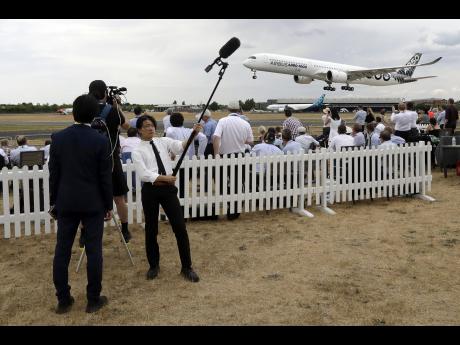Aviation sector facing trade turbulence
Aviation is soaring. Passenger traffic is up, fuel prices are under control and rising demand from Asia is driving aircraft orders.
So what could possibly go wrong? One big thing: A trade war.
Aircraft makers at this week's Farnborough International Airshow, a biannual extravaganza where billions of dollars of planes and parts are bought, say thousands of jobs are at risk in this most international of industries as US President Donald Trump threatens to raise tariffs on a variety of goods and other countries prepare to retaliate.
Aviation experts say American companies like Chicago-based Boeing will take the first hit because most of US aerospace production goes to foreign buyers.
"Well over 80 per cent of US commercial aerospace is exported," said Richard Aboulafiah, a respected aviation analyst at the Teal Group. "US aerospace is in the front line waiting to get shot first."
That's because aviation is truly global in production and demand. Boeing and Airbus, its European rival based in Toulouse, France, dominate the commercial aircraft market, competing for business and suppliers from China to Qatar and Canada. Being able to shop around for components makes the companies more profitable and its aircraft better.
"Aerospace thrives on free and open trade," Boeing Chief Executive Dennis Muilenburg told the BBC on Monday. "We are concerned it could affect supply chain costs, but those supply chains are flowing in both directions (between China and the US). It is an intricate network around the world."
The United States has put tariffs on US$34 billion of Chinese goods, with China responding with an equivalent sum. The Trump administration is planning tariffs on another US$200 billion in goods. The US has also put tariffs on steel and aluminium from China, the EU and several other countries, which responded in kind.
Foreign orders
Boeing, which describes itself as "the top US exporter", reported revenue of US$93.4 billion last year. It employs more than 140,000 people in the US and 65 other countries.
Almost 80 per cent of the 713 commercial aircraft orders for which Boeing identified a buyer last year came from foreign companies, according to data on Boeing's website. Flydubai, a low-cost carrier based in the United Arab Emirates, ordered 175 Boeing 737 Max aircraft in December, the company's single biggest order of the year.
China, which has been the target of much of Trump's ire when it comes to trade, is also a major customer for Boeing. Chinese companies, including the China Development Bank Financial Leasing Co. and China Aircraft Leasing Group, ordered 120 Boeing planes last year.
The global aviation industry is worth some US$838 billion in trade and investment.
Boeing is just one of 108 American companies showing off their wares at Farnborough, including major defence contractors such as Lockheed Martin, Northrop Grumman and Raytheon. Exhibitors reported orders for 856 aircraft and 1,407 engines worth US$116.6 billion during the last Farnborough air show in 2016.
-AP

